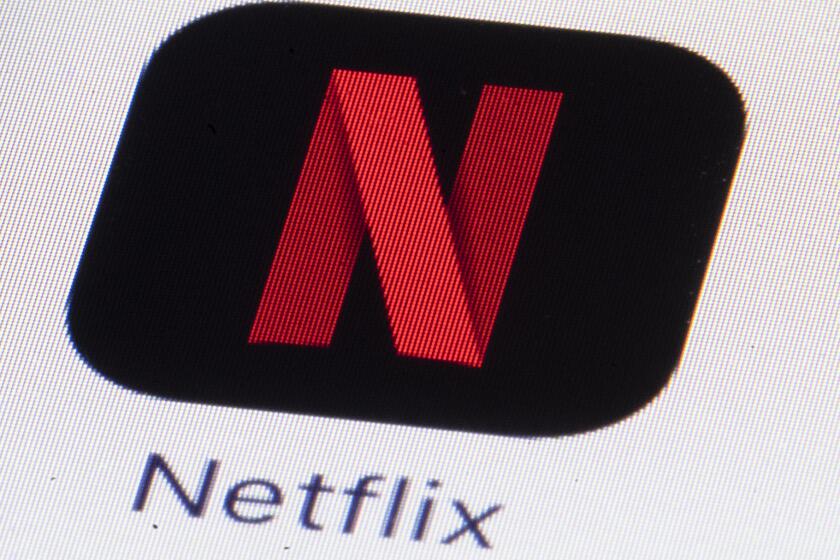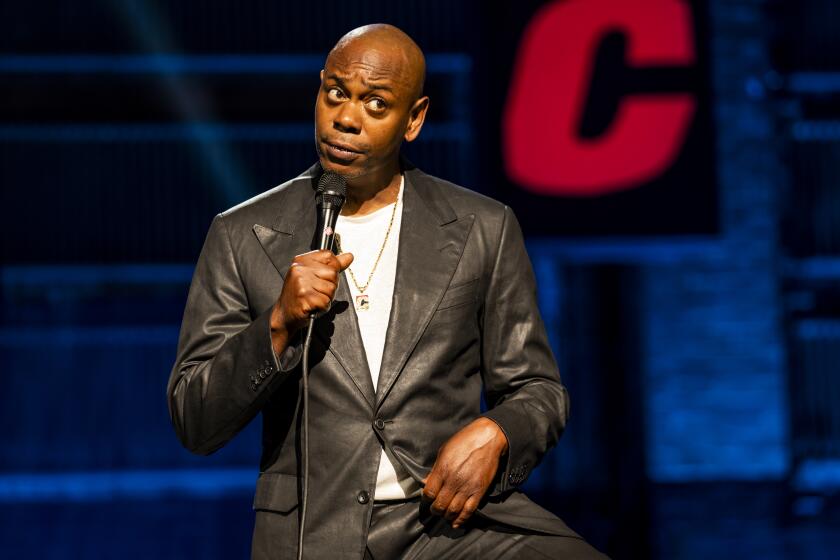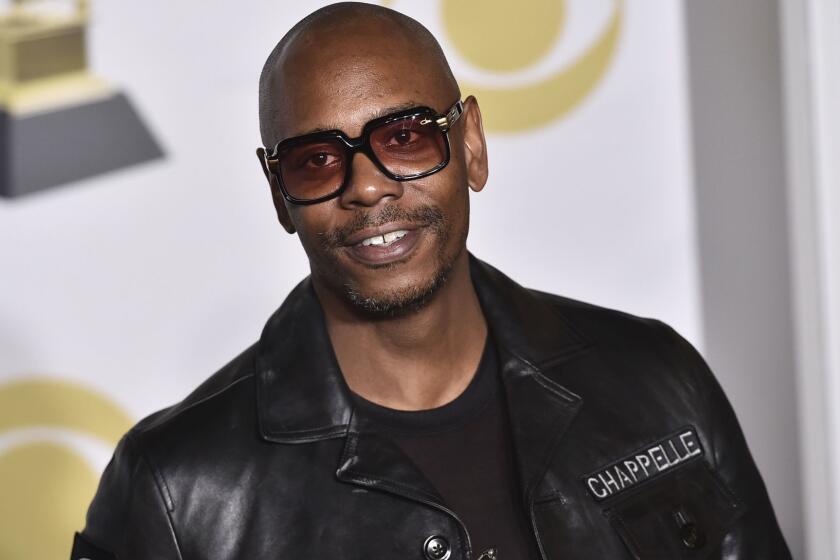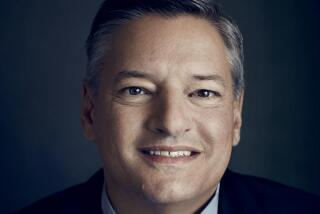Column: Ted Sarandos’ Netflix memo on Dave Chappelle is a masterwork of gaslighting
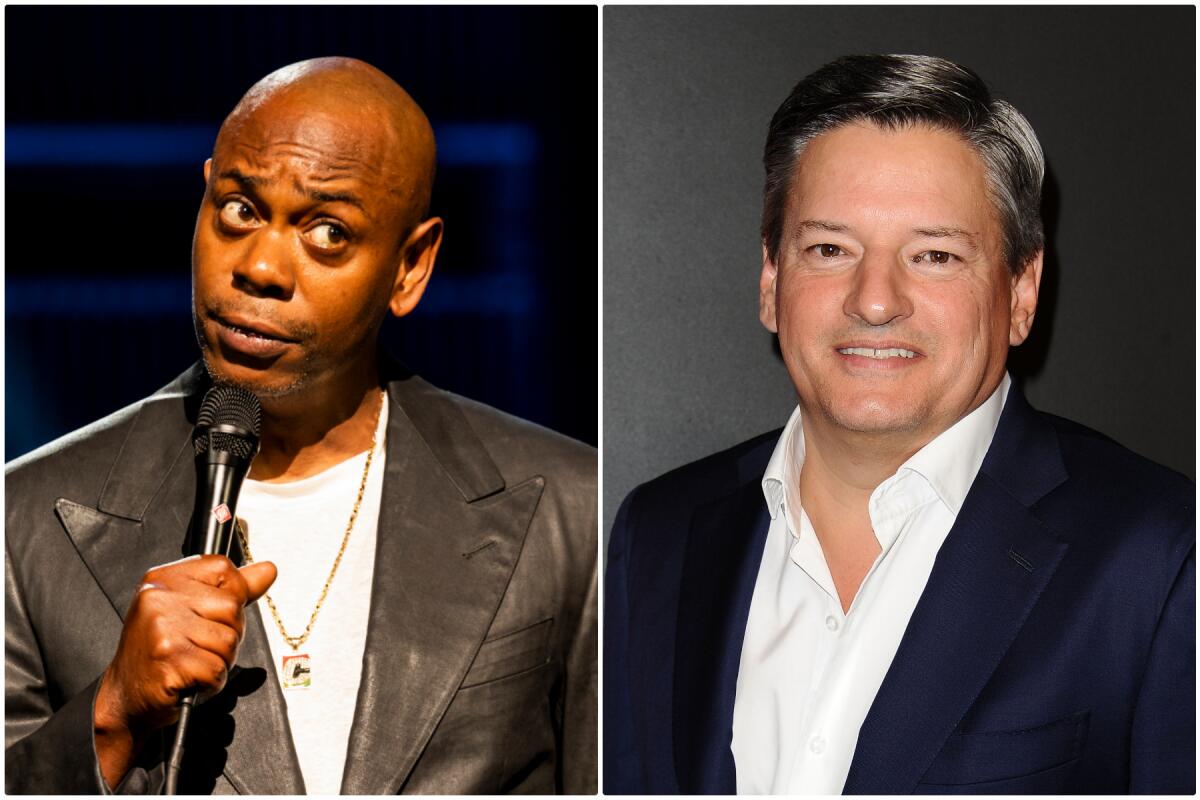
Can we talk about the Ted Sarandos memo for a minute? You know, the one obtained by Variety, in which the CEO of Netflix tells his staff that, while he understands many people are quite upset about the many homophobic and transphobic jokes in the Dave Chappelle special “The Closer,” it doesn’t really matter because the show is a hit and Chappelle is very popular?
I am obsessed with the Sarandos memo. I’ve read it about 427 times now, and it takes my breath away every time.
The first paragraph alone is a master class in psycho-villain monologuing. It opens with good Ted, kindly Ted, just wanting to “follow up,” in a solicitous HR-corporate way, about “The Closer”; he knows (because he listens) that many people in Netflix management are wondering how they should frame internal conversations about the show.
Or rather, how the managers should explain why, exactly, a self-proclaimed inclusive streamer would give Chappelle an enormous platform to insist queer people are too sensitive by doubling down on jokes about bringing back “the days of the glory hole” and trans women being like Beyond Burgers. (“That’s not blood, that’s beet juice,” he riffs.) And why Netflix would then suspend the trans team member who protested.
Netflix has suspended software engineer Terra Field and two others after the employees allegedly attended a business meeting they were not invited to.
Ted understands that Chappelle’s identification with “team TERF” — or his tale of beating up a lesbian, which begins with him explaining that he thought she was a man and ends with him pounding her breasts like they were “chicken fillets,” or his apparent belief that all queer people are white — might upset a few staff members. “It never feels good when people are hurting, especially our colleagues,” he says, like Hannibal Lecter reasonably explaining why he’s about to eat you, “so I wanted to give you some additional context.”
That “additional context”: Though “some talent may join third parties in asking us to remove the show,” this is never going to happen.
Why not? Because “Chappelle is one of the most popular stand-up comedians today, and we have a long standing deal with him. His last special ‘Sticks & Stones,’ also controversial, is our most watched, stickiest and most award-winning stand-up to date.” (Subtext: No one’s talking about “Bridgerton” any more and, with a shrinking market share, Netflix desperately needs a hit.)
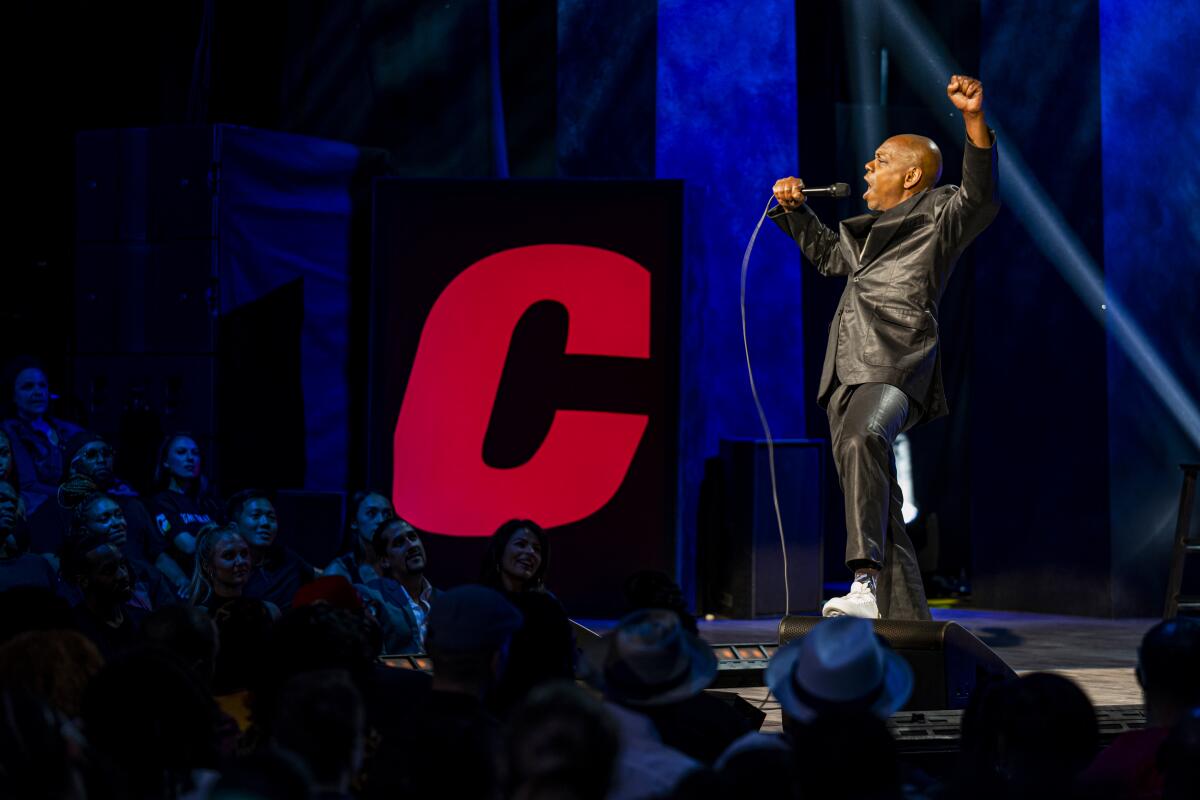
If this line of reasoning sounds vaguely familiar, perhaps you have been watching Facebook whistleblower Frances Haugen explain why that media platform refused to remove dangerous and divisive content from its site: because doing so would slow user and profit growth.
Like Facebook CEO Mark Zuckerberg, Sarandos is quick to deploy the force field of “freedom.” “As with our other talent, we work hard to support their creative freedom — even though this means there will always be content on Netflix that some people believe is harmful, like ‘Cuties,’ ‘365 Days,’ ’13 Reasons Why’ or ‘My Unorthodox Life.’”
(I’m not sure why “Space Force” or “Love Wedding Repeat” are not on this list. They were way more harmful to the notion of human creativity than the wonderful, insightful “Cuties.”)
But the Sarandos memo really gets good in paragraph three, which begins, “Several of you have also asked where we draw the line on hate….”
Sorry, I had to pause for the horrified laughter that I fail to stifle every time I read this line, as I try to imagine the conversation that inspired it. “Um, Mr. Sarandos, hi, quick question. I was wondering, and please don’t take this the wrong way because I’m a very big fan and I just loved ‘Cuties’ and ‘13 Reasons Why.’ But still, I’m just wondering — I mean, I’ve been asked by people who are wondering — where do we stand on hate, exactly?”
I think we can all say, with confidence, that if we were fortunate enough to be the chief executive of a major platform and members of our staff responded to the airing of a comedy special by asking us to clarify our stance on hate, we might take a beat to reflect.
Sarandos, however, does not. “We don’t allow titles on Netflix that are designed to incite hate or violence, and we don’t believe ‘The Closer’ crosses that line.”
Chappelle has painfully glaring blind spots when it comes to intersectionality. Yes, you can be Black and queer at the same time.
Yet Sarandos does understand that “creative freedom” is a tough concept to grasp, especially for those less enlightened than he on the nature of art and comedy (ahem, “Love Wedding Repeat”). “Distinguishing between commentary and harm is hard,” he concedes, “especially with stand-up comedy which exists to push boundaries. Some people find the art of stand-up to be mean-spirited but our members enjoy it, and it’s an important part of our content offering.”
While that may not be the textbook definition of creative freedom, the memo does help clarify another slippery concept — “gaslighting.” Per this memo, if you question the wisdom of promoting a special that revolves around a famous comedian responding to accusations of homo- and transphobia by telling more homo- and transphobic “jokes” while insisting that people who have historically been denounced, abused and murdered for simply existing need to get over themselves, then you obviously do not understand the nature of comedy.
In other words, it’s not a Netflix problem, it’s a you problem.
Indeed, you probably find the entire genre of stand-up too “mean-spirited,” so you shouldn’t try to foist your milquetoast taste on the rest of us.
For the record:
10:58 a.m. Oct. 13, 2021An earlier version of this story referred to Eddie Izzard by a male pronoun. Izzard began exclusively using she/her pronouns in 2020.
I have never yet met a person who objects to “stand-up comedy.” Some comedians are meaner or bluer or more self-denigrating than others and taste does vary. But stand-up comedy is not, by definition, offensive. I just watched Eddie Izzard’s “Dress to Kill,” which I love even more than the Sarandos letter, and Izzard somehow manages to do quite a lot of stand-up without being mean to anyone. In heels.
Of course “Dress to Kill” is on Amazon Prime, so maybe it’s a branding problem?
Maybe, maybe not. The last comedy special to hit big on Netflix was Hannah Gadsby‘s 2018 “Nanette,” which vivisected the (straight, male) toxicity behind certain kinds of comedy. In a case of brutal irony, the special includes the story of Gadsby, who is lesbian, being beaten up by a man who mistook her for another man, a traumatic event she first tells as a joke and then unspools to reveal exactly how unfunny it is.
Strangely, Sarandos neglects to mention “Nanette” in his memo (possibly because he does not want Gadsby’s take on Chappelle’s show) even as he pats himself on the back for “working hard to ensure more people see their lives reflected on screen and that under-represented communities are not defined by the single story.”
In 2018, there were three names that seemingly everyone in or around comedy had an opinion about: Hannah Gadsby, Drew Michael and Donald Trump.
This is absolutely true, though I’m not sure Netflix should expect a parade in its honor; “One Day at a Time” was canceled, after all, and the streamer’s shiniest object, “The Crown,” is not exactly a showcase for an underrepresented community.
But what is the point of opening up the conversation to different “communities” if, when push comes to shove, you’re not going to listen to them? If the LGBTQ community, including members of your own staff, tells you that — even when couched in calling out racism — 70 minutes of Chappelle insulting gay and trans people is hateful, how can your response be “um, no it’s not”?
Instead of writing this wonderfully terrible, lip-servicey, tone-deaf memo on “hard and uncomfortable issues,” just say what you mean.
That it doesn’t matter that “The Closer” is an obvious f-you to anyone who has criticized Chappelle for his bizarre obsession with attacking the LGBTQ community because Chappelle is, as he says at the beginning of the show, rich and famous.
The fact that he is Black makes his power and influence regrettably remarkable, but the way he uses them in this case isn’t edgy or ground-breaking at all. What on Earth is edgy about an AIDS joke? Or a “she’s got an Adam’s apple” joke? As Chappelle knows all too well, lots of people are bigoted; lots of people think anyone who doesn’t look like them should just shut up and take it. Many people will watch “The Closer” for the same reason they watch Fox News. Because it validates the way they already feel. That‘s the problem.
That — and the fact that Netflix is apparently cool with telling its staff and the communities they court that inclusion is important, just not as important as driving up the numbers and making lots and lots of money.
Dave Chappelle says “Chappelle’s Show” was licensed to Netflix and HBO Max without his permission or any payment. It was legal, he says, but not right.
More to Read
The biggest entertainment stories
Get our big stories about Hollywood, film, television, music, arts, culture and more right in your inbox as soon as they publish.
You may occasionally receive promotional content from the Los Angeles Times.
